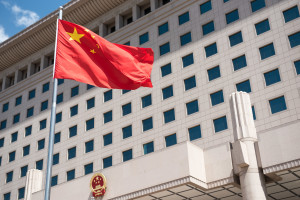President Biden has signed a new executive order restricting U.S. investment in some Chinese advanced technology areas, specifically semiconductors, artificial intelligence and quantum computing, which the administration has said could benefit Beijing’s military.
The Treasury Department, which will implement the measure, released a notice on Wednesday detailing plans to solicit feedback as the administration works on the rulemaking process and further defines the final outlines of what is permissible under the executive order.

“This is a national security action, not an economic one. We recognize the important role that cross-border investment flows play in the U.S.’ economic vitality and this executive order is merely protecting our national security interests while maintaining that long-standing commitment to open investment,” a senior administration official told reporters on Wednesday. “As we have repeatedly said, we are pursuing a policy of de-risking with respect to [China], to include taking targeted national security actions, not decoupling our economies and this policy reflects that approach.”
Under the executive order, U.S. private equity and capital investment firms would be prohibited from investing in Chinese companies’ work within those three technology areas and requires firms to notify the Treasury Department of “transactions involving certain technologies and products that may contribute to the threat to the national security of the United States.”
“China doesn’t need our money. They are a net capital exporter,” a senior administration official said. “The thing they don’t have is the know-how.”
The Treasury Department said it will seek comments over the next 45 days to inform draft regulations related to the executive order.
“Treasury will take this input into account as it develops draft regulations, including refining the definitions of key terms, setting forth the notification requirements, and establishing the penalty and enforcement processes for violations, among other things,” the department said in a statement.
The executive order follows lawmakers’ recent interest in similar measures, to include the Senate voting 91 to 6 in favor of adopting an amendment to the fiscal year 2024 National Defense Authorization Act (NDAA) from Sens. John Cornyn (R-Texas) and Bob Casey (D-Pa.) to increase transparency into investments by American entities in sensitive technologies from China as well as Russia, Iran, and North Korea (Defense Daily, July 28).
An unclassified version of the new National Defense Strategy released in late October detailed the “pacing challenge” of China as the department’s prime focus over the more “acute threat” presented by Russia, citing Beijing as “the most comprehensive and serious challenge to U.S. national security” (Defense Daily, Oct. 27).
The U.S.-China Economic and Security Review Commission also announced Wednesday it will hold a public hearing on Aug. 21 on China’s economic positioning as well as “developments in U.S.-China trade relations and U.S. supply chain resiliency, looking at the major trends reshaping U.S. supply chain strategies in addition to China’s efforts to secure dominance in key technology areas, such as clean energy technology.”